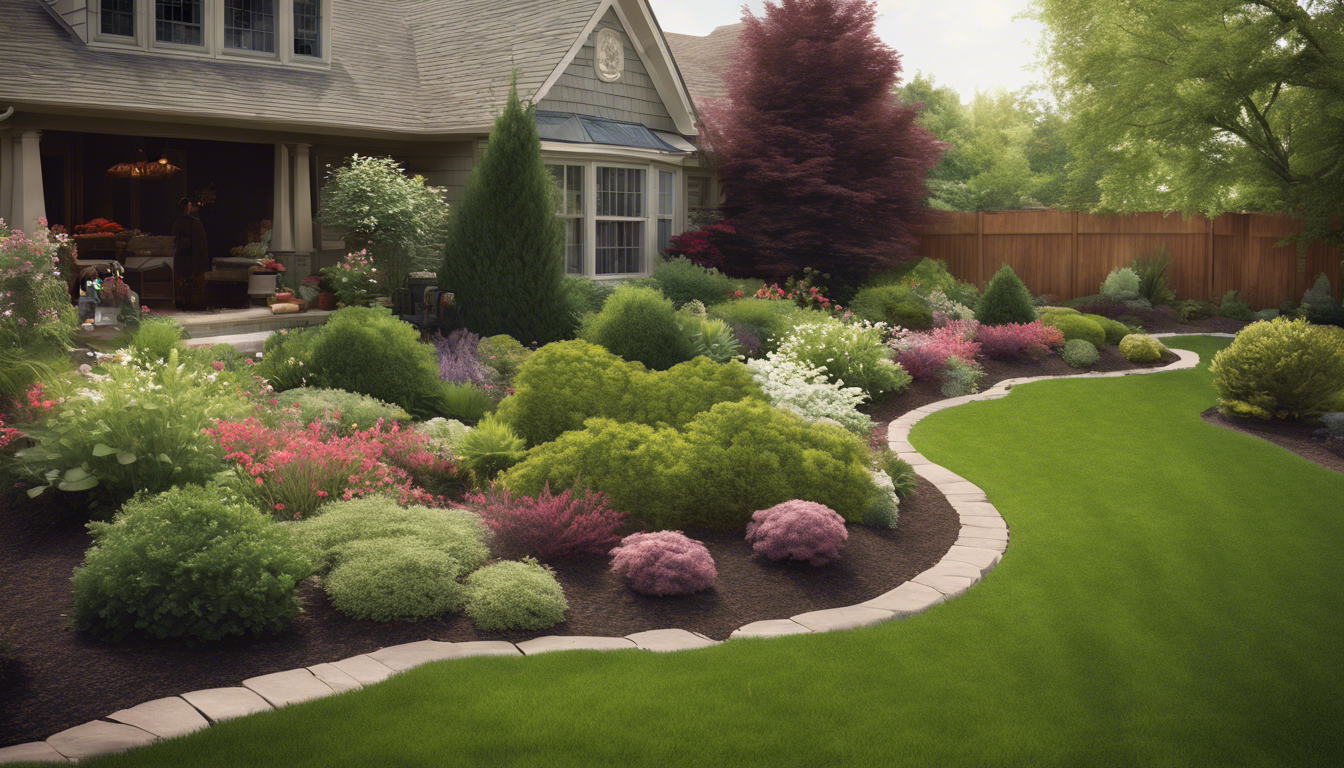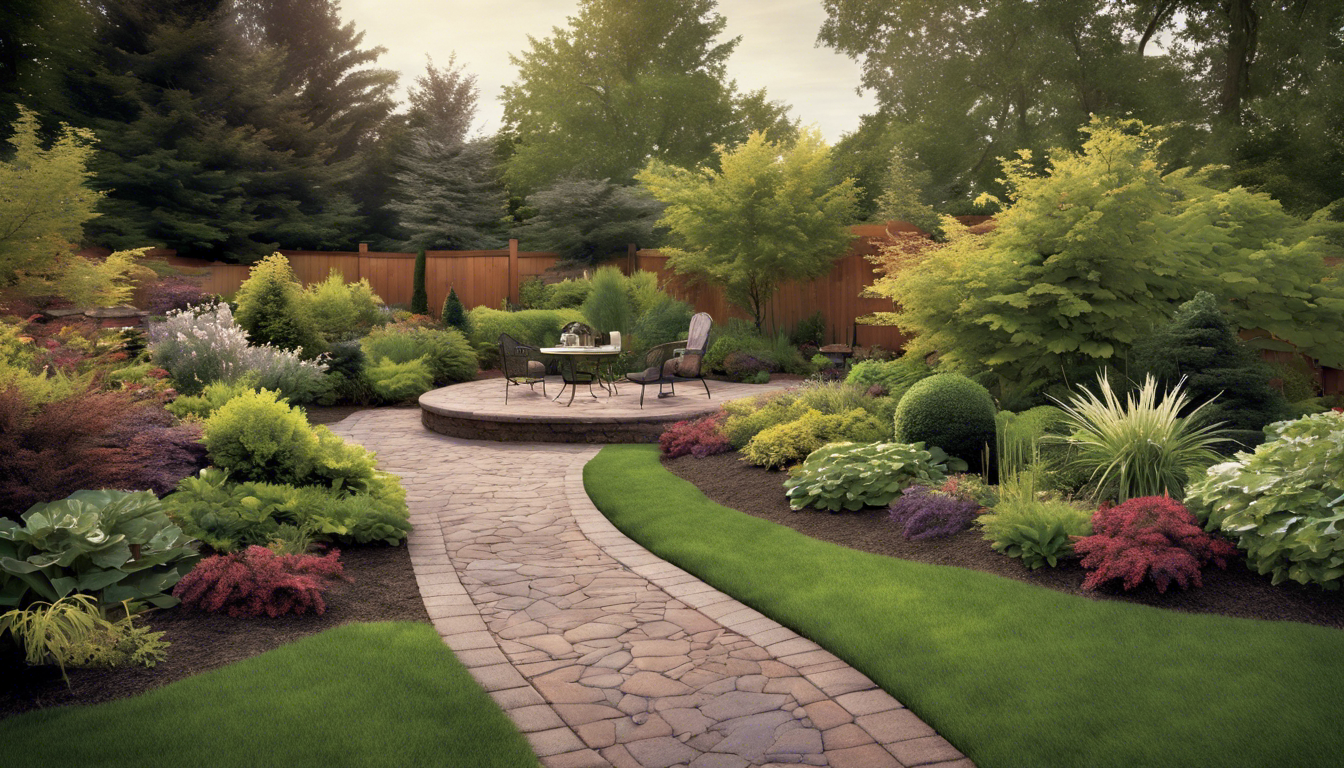Title: Enhance Your Outdoor Space and Keep Unwanted Pests at Bay!
In this article, we will explore how landscaping can be a powerful tool in preventing unwanted pests from invading your outdoor space. Learn how simple changes in your yard can make a big difference in keeping critters away.
Understanding the Relationship Between Landscaping and Pest Control

Landscaping plays a crucial role in pest control, as the design and maintenance of outdoor spaces can either attract or deter various pests. A well-thought-out landscaping plan can significantly reduce the risk of pest infestations, making it an integral part of integrated pest management strategies.
Importance of Landscaping in Pest Control
Landscaping elements such as plants, mulch, water features, and artificial structures can create environments that are either conducive or hostile to pests. Understanding how landscaping choices influence pest behavior is essential for effective pest control. For example, overgrown vegetation can provide shelter and breeding grounds for pests like rodents and mosquitoes, while certain plant species can attract specific insects.
Key Strategies for Pest Control Through Landscaping
To optimize pest control through landscaping, consider implementing the following strategies:
- Diversify plant species: Plant a variety of species to reduce the risk of pest damage and promote a balanced ecosystem.
- Maintain proper drainage: Prevent standing water that can attract pests like mosquitoes by ensuring adequate drainage in the landscape.
- Trim vegetation regularly: Keep plants and shrubs well-maintained to eliminate potential hiding spots for pests.
- Use pest-resistant plants: Select plant species known for their resistance to common pests to minimize the need for chemical interventions.
Integrated Pest Management Approach
Integrating landscaping practices with other pest control methods is key to long-term pest management success. Integrated Pest Management (IPM) combines preventive measures, monitoring, and targeted interventions to control pests while minimizing environmental impact. By incorporating landscaping strategies into an IPM framework, property owners can achieve a sustainable and effective pest control solution.
Understanding the relationship between landscaping and pest control is essential for creating pest-resistant outdoor environments. By leveraging landscaping practices to deter pests and promote biodiversity, property owners can reduce reliance on chemical pesticides and create healthier ecosystems.
Choosing the Right Plants to Deter Pests

when it comes to creating a pest-resistant garden or outdoor space, selecting the right plants can make a significant difference. By strategically incorporating pest-repellent plants, you can naturally prevent and deter unwanted critters from invading your space. Here are some tips on landscaping with pest-deterring plants to maintain a harmonious outdoor environment:
1. understand your local pests
Before selecting plants for your landscaping project, it is important to research and understand the common pests in your area. By knowing which pests you are dealing with, you can choose plants that are specifically known to deter these intruders. For example, marigolds are effective in repelling nematodes, while lavender can deter mosquitoes.
2. choose pest-repellent plants
Opt for plants that have natural pest-repellent properties to create a barrier against unwanted insects and animals. Some popular pest-deterring plants include:
- lavender
- rosemary
- marigolds
- chrysanthemums
- garlic
- basil
3. incorporate diversity in your garden
By planting a variety of trees, shrubs, flowers, and herbs in your garden, you can discourage pests from taking up residence. Diversity in plant species not only enhances the aesthetic appeal of your landscape but also helps in naturally balancing the ecosystem, making it less appealing to pests.
4. practice companion planting
Companion planting involves placing complementary plants together to enhance growth and deter pests. For instance, planting basil near tomatoes can help repel pests that commonly affect tomato plants. Research companion planting combinations that work best for deterring pests in your garden.
By carefully selecting and strategically placing pest-deterring plants in your landscaping design, you can create a beautiful outdoor space that is less susceptible to pest infestations. Remember to regularly maintain your garden and monitor plant health to ensure their effectiveness in deterring pests.
Implementing Natural Pest Control Methods in Your Landscape

As an outdoor enthusiast who has been dealing with critters for decades, implementing natural pest control methods in your landscape can be both beneficial for the environment and effective in keeping unwanted pests at bay.
maintain a balanced ecosystem
One of the key aspects of implementing natural pest control methods in your landscape is to maintain a balanced ecosystem. By planting a variety of native plants, you can attract beneficial insects that will help control pest populations naturally. Additionally, avoiding the use of chemical pesticides will prevent harm to these beneficial insects and create a healthier environment for all species.
encourage natural predators
Another effective way to control pests in your landscape is to encourage natural predators. For example, installing bird feeders or bat houses can attract birds and bats that feed on insects. Ladybugs, lacewings, and predatory wasps are also beneficial insects that can help keep pest populations in check.
use physical barriers
For larger pests such as rabbits or deer, using physical barriers can be an effective method of control. Fences, netting, or row covers can help protect your plants from being eaten without the need for harmful chemicals.
practice crop rotation
Crop rotation is another natural pest control method that can help disrupt pest cycles and prevent infestations. By rotating the types of plants grown in your garden, you can reduce the likelihood of pests becoming established and spreading throughout your landscape.
incorporate companion planting
Companion planting involves planting certain species together to benefit each other in various ways. Some plants can repel pests, attract beneficial insects, or provide nutrients to neighboring plants. Researching which plants work well together in your specific climate can help naturally control pests in your landscape.
By incorporating these natural pest control methods in your landscape, you can create a harmonious ecosystem where pests are kept in check without the use of harmful chemicals. Not only will this benefit the environment, but it will also create a healthier and more sustainable landscape for years to come.
Maintaining a Pest-Resistant Landscape
Creating a pest-resistant landscape is essential for any outdoor enthusiast or homeowner looking to keep their property free from unwanted critters. By following a few simple steps and incorporating natural methods, you can effectively deter pests and promote a healthy environment for your plants and garden.
choose pest-resistant plants
One of the first steps in maintaining a pest-resistant landscape is selecting plants that are naturally resistant to common pests. By choosing pest-resistant plants, you can reduce the likelihood of infestations and decrease the need for chemical pesticides. Some examples of pest-resistant plants include marigolds, lavender, and chrysanthemums.
practice good garden hygiene
Keeping your garden clean and tidy is crucial for preventing pests from taking up residence. Remove any dead or decaying plant matter, as these can attract pests. Regularly clean up fallen leaves and debris, and properly dispose of any waste. By maintaining good garden hygiene, you can significantly reduce the risk of pest infestations.
encourage natural predators
One effective way to control pests in your landscape is to attract natural predators that feed on them. Consider planting flowers that attract beneficial insects like ladybugs, lacewings, and predatory wasps. These insects help keep pest populations in check, reducing the need for chemical interventions.
use organic pest control methods
When pest problems do arise, opt for organic pest control methods rather than harsh chemicals. Solutions like neem oil, diatomaceous earth, and insecticidal soaps can effectively control pests without harming beneficial insects or the environment. Integrated pest management (IPM) techniques can also help in maintaining a pest-resistant landscape by combining multiple strategies for long-term pest control.
monitor and inspect regularly
Regularly monitoring your landscape for signs of pest activity is key to preventing infestations. Inspect your plants for any damage, unusual spots, or droppings that could indicate the presence of pests. Early detection allows for quick intervention, reducing the impact pests can have on your landscape.
By implementing these pest-resistant landscape practices, you can create a healthy and harmonious environment for your plants while keeping unwanted critters at bay. Prioritizing natural methods and sustainable practices not only benefits your landscape but also contributes to a pest-resistant ecosystem in the long run.
Consulting with Professional Landscapers for Pest Prevention Solutions
dealing with pesky pests in your outdoor spaces can be a frustrating challenge. whether you’re a homeowner, a business owner, or a property manager, keeping pests at bay is crucial for maintaining a healthy and thriving environment. one effective solution is to consult with professional landscapers who specialize in pest prevention.
why work with professional landscapers?
professional landscapers have the expertise, experience, and resources to effectively address pest issues in your outdoor areas. they can assess your property, identify potential pest threats, and recommend tailored solutions to prevent infestations. by collaborating with professional landscapers, you can benefit from their knowledge and skills in creating pest-resistant landscapes.
customized pest prevention strategies
each outdoor space is unique, and professional landscapers can develop customized pest prevention strategies based on the specific needs of your property. whether you’re dealing with common garden pests, invasive insects, or wildlife intrusions, landscapers can implement targeted solutions to protect your landscape.
integrated pest management techniques
professional landscapers often use integrated pest management (IPM) techniques to address pest issues in a holistic and environmentally friendly manner. IPM focuses on proactive strategies such as natural pest control methods, habitat modification, and pest-resistant plant selections to minimize the use of pesticides.
ongoing monitoring and maintenance
working with professional landscapers for pest prevention doesn’t end with the initial interventions. landscapers can provide ongoing monitoring and maintenance services to ensure that your outdoor spaces remain pest-free. with regular inspections and preventive measures, you can safeguard your landscape from potential pest problems.
collaborate with experts for a pest-free environment
consulting with professional landscapers for pest prevention solutions is a proactive approach to safeguarding your outdoor spaces from unwanted intruders. by entrusting your pest management needs to knowledgeable professionals, you can enjoy a beautiful, healthy, and pest-free environment all year round.
